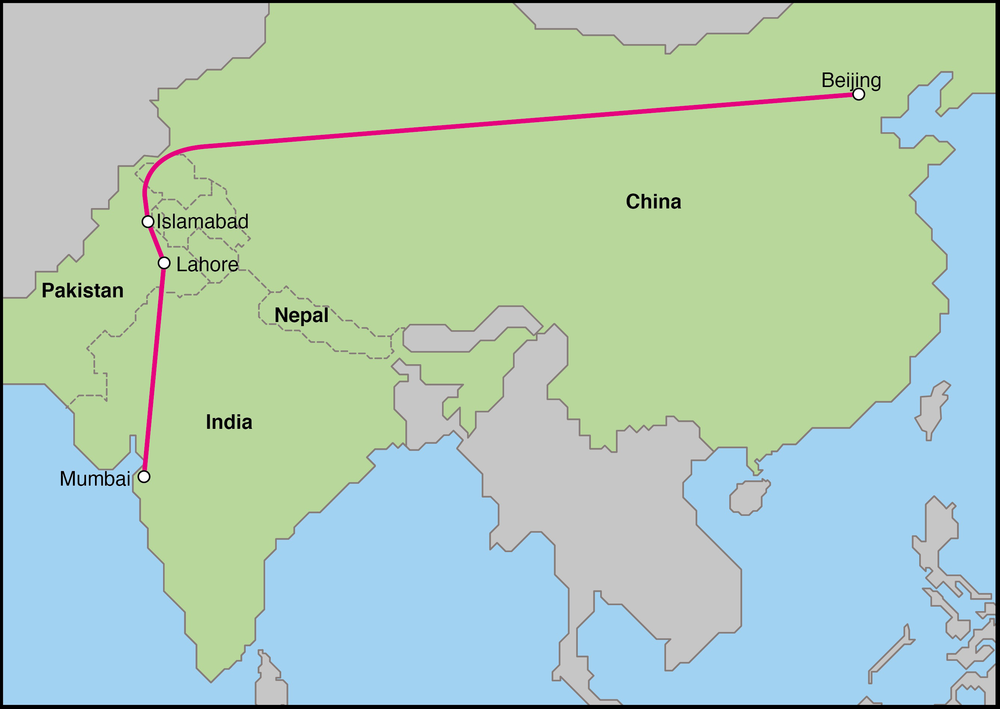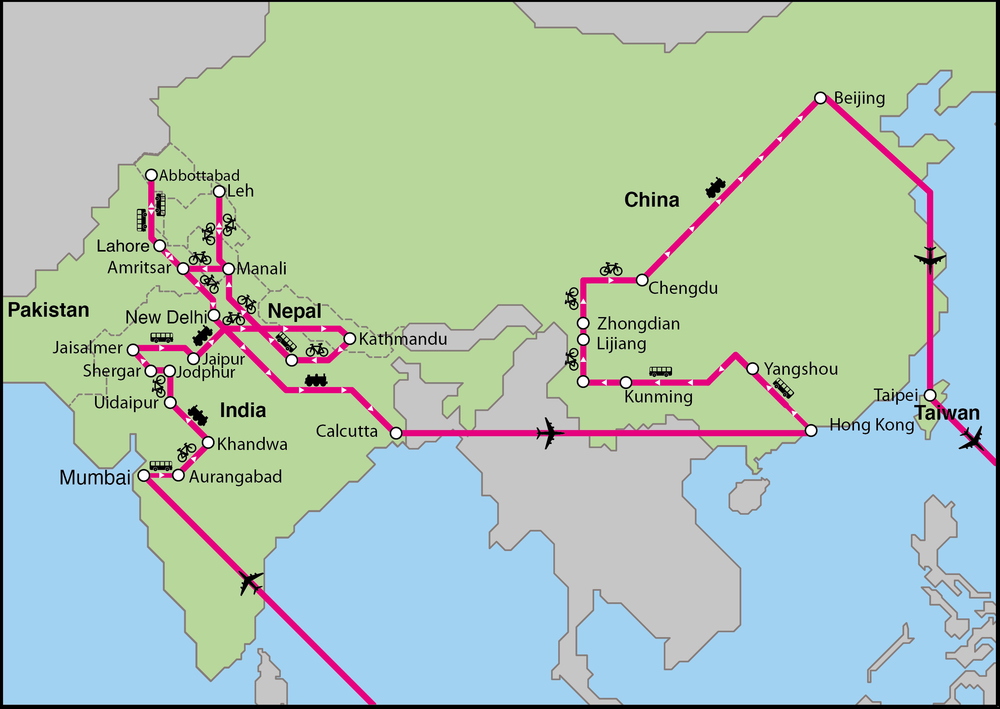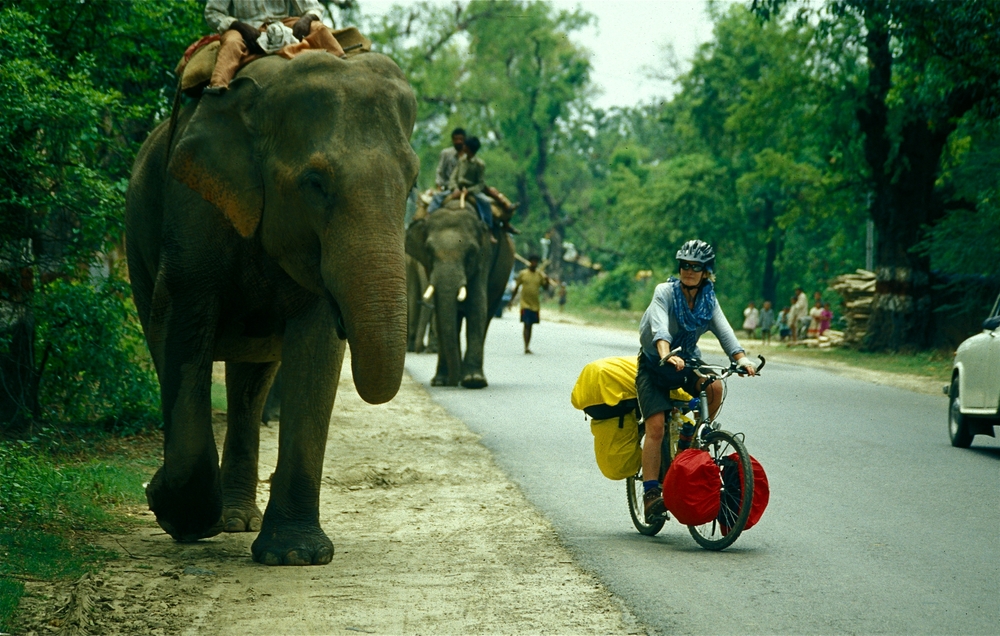Bombay to Beijing by Bicycle (32 page)
Read Bombay to Beijing by Bicycle Online
Authors: Russell McGilton


This was my actual journey:

Yes, it makes me look like I was smoking crack the whole time! What the hell …
Now, I hadn’t cycled from Bombay to Beijing at all, though I had traversed a sizeable chunk, nearly 7000 kilometres. If I had taken a more direct route I might have done it, but then I might also have missed out on meeting some of the most amazing people and seeing some of the most beautiful scenery I was ever likely to come across.
And there was the book, which, to mark a cliché, was always my real destination. At home there were piles of mailed journals, badly wrapped in Indian hessian cloth, scuff-marked by long, arduous sea voyages and smelling of an exotic past.
Still, not doing the entire trip by bike gnawed at me and the same thought shuffled around in my head: what was I going to call the book now?
I pushed the bike out of the square, mulling it over, speaking out loud to myself.
‘“Bombay to Beijing by …”’
I pulled on my gloves.
‘No, no. “Mumbai to Beijing by …”’
I snapped my helmet on and moved into the cycle traffic.
‘No, I really like the “B” sound. What about “Bombay to Beijing by Bicycle … sort of … kinda”?’
I dodged a woman trying to cross the road with four upside-down chickens squawking in her hands.
‘No! That won’t do.’
I cycled onwards to the train station. ‘“Bombay to Beijing by … by …”’
Struggling with it all I disappeared into the thick crowds and once again, got completely lost.

I eventually did meet with Rebecca in Taipei, but we did not end up together. She did, however, go on to have her own incredible cycle adventures through Europe and Canada.
Maria still lives in the UK doing a hundred things a week, and Uros went on to drive through Southern India in 2007 and has since travelled all over South America, though not by bicycle.
Since Bombay to Beijing, I’ve cycled Slovenia and the South Island of New Zealand. I’ve also returned to India twice – travelling to Southern India and to Mumbai to do a talk on this very journey.
The one-man show based on this book won the George Fairfax Playwright Competition in 2003, performed by Mark Pegler and directed and dramaturged by Sue Ingleton. In 2005, I remounted the show as a performer and, with the help of Adam Pierzchalskie, the piece was workshopped and directed by Kimberley Grigg. The revised show went on to be performed to a sell-out season at the Melbourne Fringe Festival 2005 and at the Melbourne International Comedy Festival 2006. I later toured it, dramaturged by David Woods, to the Edinburgh Festival 2008.
For more information on more of my adventures and shows go to www.russellmcgilton.com.au
First and foremost I’d like to thank the generosity of the people in India, Nepal, Pakistan and China in those moments that all travellers need – the kindness of strangers.
For the 2012 eBook edition: I’d like to thank my agent at Curtis Brown Australia, Pippa Masson, for her continual encouragement; Joel Naoum at Momentum, Pan Macmillan; Graeme Wiggins for the wonderful map design; my partner Sarah Jane Chapman for preliminary proofs on the manuscript (not to mention her love and support); Jane Koenig for her suggestions; Alan Griffiths, Maria Yuen, Daniel Coward, Mary and Clency Bernard (on behalf of Krista Bernard), and Rebecca Gosling for their generous permissions, and the comedian, Damian Callinan, for his funny suggestions on rhinos in Nepal.
For the 2004 edition: Kath Knapsey, who did a really fantastic job of pre-edit; Alan Griffiths, Samantha Page, Carolyn Court, Lucy Cooper, Fabian Dattner, Louise Swinn, Zoe Dattner, Graeme Wiggins, Trevor McGilton, Simone Metzler, Rick Juliusson, Bradley Hughes, Andrew Gardner, Erika Niesner, Jason Howell, Eli Court, Vineet Singh, Devendra G. Gaidlani, Govinda, Corrina Syke, Eric Svirskis and Celeste Young, who all made valuable contributions and suggestions.
I’d also like to thank travelling companions Uros Pust for being there in Delhi at the right time; Maria Yuen; Dr Pushkar; Dr Chawla; Heather McLean and Tulsicharan Bisht for looking after me when I was ill. And, with the deepest respect and gratitude to Rebecca Gosling for her courage, strength and incredible patience.
Last but not least, thanks to my gorgeous sister Fiona for being there when I was at my lowest and bringing me cups of tea and hugs when everything seemed a bloody mess!
(Throughout the book I have changed and omitted full names of some people for the sake of privacy.)
A mountain bike is recommended, mainly because the roads are bad in India and Nepal particularly. Roads are generally better in China. Also, a lot of bike shops in India and Nepal only stock 26-inch tubes and tyres but not 27-inch tyres for touring bikes. It’s advisable to get two-inch wide tyres as this will lessen the impact from the road. You could pack 1.5 inch for better road conditions but this is more weight.
Make sure you test out your bike if it’s a new bike. I made the mistake of getting a bike that was too big and not testing it enough. The distance between the headset and the set was too far and caused ongoing shoulder pain.
Plan out your day. In the beginning, four to five hours per day in the first two weeks (80 kilometres per day) should be a good start. I took a four-day trip through the mountainous Dargo Plains near Bright in the north east of Victoria. This clarified for me what I needed to take.
To save on money, a lot of camping accessories can be bought in Kathmandu at a fraction of the cost, though quality is somewhat dubious on items such as the sleeping bags and so-called Gortex Jackets.
Ask locals all the time so that you’re heading in the right direction (though this can be a double-edged sword).
Odometers, while useful, can mess with your brain as you try to beat the kilometres rather than enjoy the scenery.
Pack the heavier things in the rear panniers and leave the lighter things in the front panniers, as it will become harder to turn with so much weight in the front. Also, front racks are not as strong as your rear ones.
Put snacks and food in a place you can get to easily and always make that the same spot so you don’t have to look in both panniers. You’ll be surprised how often you stop to eat, usually every 30 minutes. Also, to save on repacking things, I would put my sleeping bag and winter clothes in my right rear pannier while my summer clothes were in the left pannier.
A handlebar bag is extremely useful for putting valuables in as it detaches easily. I put my passport, money, notebook, camera, and Alien Multi-tool in there (I often had to stop to adjust the bike). Great for when you’re going off to have lunch.
A medium-sized backpack was useful, as I was able to use it for backpacking through Nepal. Get a decent hiking strap (not a bungee) and this should be more than adequate to keep it in place.
In hot seasons, leave as early as possible. I often got up at five am, stopped at 11.30, and then resumed when it was bearable (usually after three p.m.).
Earplugs! Take the best you can find and take plenty. Essential for two reasons. Traffic is often loud and drivers love to toot their super-charged horns. Also, at night, in India particularly, they love to talk … ALL NIGHT!
Get good detailed maps but also follow this up with maps from tourist centres. You might also want to print off some Google Maps.
Wear visible cycle shirts so you can be seen, but they also breathe a lot better than T-shirts.
Dress appropriately for the local culture. Cycle underwear with normal shorts over the top.
Take plenty of sunscreen. It’s hard to come by good sunscreen in China and India.
Maintain your bike regularly. Clean the drive-train daily, and check any loose nuts and bolts before you begin your ride. Grease your cables as often as possible to save on wear and tear. You don’t have to loosen the cable nut at the end but rather move the plastic sleeve casing out of its mounts. Also, check your spokes after every trip, making sure they’re not broken or loose. You can even go as far as taping up nuts and bolts on the bike with electrical tape. This will stop you from losing them.
Perhaps invest in a split-seat as this will take pressure off your perineum.
Write every day even if you’re not going to get it published. Years later, your notes will serve as signposts for your memories.
Take as little as possible! Of course this depends where and when you go. If I were to cycle to India again I wouldn’t take any camping equipment or cooking implements, saving at least five kilos of weight. I’d even take an iPad or ereader so I wouldn’t have to lug books around. Some bicycle tourers I’ve met take a Macbook Air and load videos of their trips straight on to it.
Tools – take a cassette nut or spanner. You may get a broken spoke on the inside of the cogs and there’s no way you’ll be able to replace the spoke. Chain whip – improvise with left over chain links.
My Cycle Equipment (total weight with bike: 40 kg)
- Trek II mountain bike (chrome-alloy forks)
- 26-inch, two-inch width, Continental Town and Country tyres (not recommended as side walls went)
- Cycle Odometer
- Four panniers (front and rear). Ortlieb make some of the best panniers and it’s worth the investment.
- Rear and front racks (Blackburn). These broke
- Three water cages and bottles
- Tools – Alien Multi-tool (includes chain brake), cassette nut, shifter, universal spanners, Phillips head screwdriver, flat head screwdriver, spare Allen Keys
- Puncture repair kit
- Cassette (rear sprockets). Purchased in Kathmandu
- Chain
- Foldable Kevlar Tyre
- Four tubes (I did buy numerous Indian tubes which were heavier)
- Four brake and gear cables
- Four brake shoes (wore out the front set)
- D-Lock
- Reflective waist flag
- SLR Minolta (analogue)
- 100 rolls of 35 mm film
- Zoom lens (purchased in Kathmandu)
- Polariser (important for snow-covered areas)
- Canon Sure-shot (replacement – bought in Kunming)
- Two lithium batteries
- One man tent (leaked and sent back)
- Two man tent (picked up in Dharamsala)
- Sleeping bag (four season)
- Inflatable ¾ mat
- Stove
- Two pans
- Plastic cup
- Foldable water bladder
- Mosquito net
- Head-torch – useful for night cycling but also for when the power went out, which was often in India
- Lighter
- Water bottle bag for hiking (Kathmandu)
- Cycle underwear shorts
- One long sleeve cycle shirt
- Two pairs of shorts
- Hiking boots
- SPD cycle shoes (clipless pedal system – cleats click into the pedal bindings similar to skis)
- Cycle gloves (important – reduces nerve damage to your hands)
- Thongs (flip flops)
- Three shirts (one long sleeve)
- One pair of pants
- Three pairs of socks
- Hiking jacket
- Cycle jacket
- Gortex gloves
- Thermal underwear
- Silk liner for sleeping bag (increases warmth)
- Woollen cap
- Sun hat
- Three pairs of sunglasses (though I soon lost all of these!)
- Scarf
- Two sarongs (useful for sun protection and as a sheet)
- India and China Nelles 1:4 ratio
- Other maps from tourist officers
- Notebooks (bought locally then posted back to Australia)
- Rough Guide to India
- Nepal
(bought in Delhi) Lonely Planet - Pakistan
(bought in Delhi) Lonely Planet - China
(bought in Calcutta) Let’s Go! - Phrase books – Hindi and Mandarin (purchased locally)
- Two rolls of Gaffer tape
- Sewing kit
- Plastic tie grips (great for tying cable back)
- Hose bands (for broken racks)
- Sunscreen
- Toiletries
- Pencil cases for throwing tools in
- Passport, travel documents
- Earplugs (essential!)
- Medical kit
- Water proof pockets for documents
- Walkman and ten audio tapes